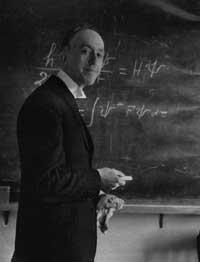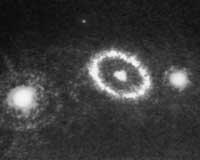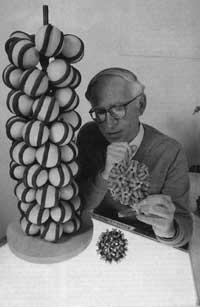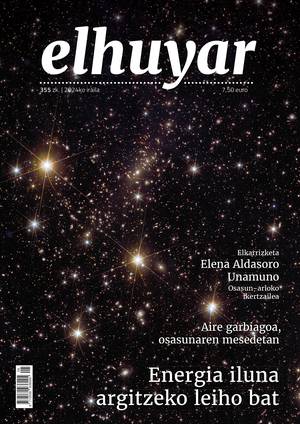Giant lame (dark aspects of science)
To say that reason arose in Ancient Greece would probably be an abuse. The abuse and excessive contempt of the eleven peoples who populated the land before them. Because reason did not suddenly come into the world, simply in a place where darkness would have been nothing else. But one cannot deny the talent and genius of those wonderful Greeks to analyze, measure and enjoy the world around them.

There was born, to a large extent, the concept we know today as science. However, the touched thinkers, very different, applied science. For the Greeks, science sought personal development. They researched the universe, yes, but with the intention of knowing its interior better.
Today, however, we could say that the progress of science aims at environmental control (why not? ). The new technology wants to offer ownership of everything, and we, out of gratitude, bow down to it, often forgetting our other aspects, or at least for a moment. Yes, it is true that in recent years other ways are developing, without sacrificing spiritual spaces (or those that call themselves this way).
Examples of this can be seen from anywhere. The fact that science did not fully comply with what was promised seems that many favor their exclusion, with the danger that this entails, more and more quickly. And it is as important as the need to emphasize the impossibility and limits of reason of science and dangers, to denounce the cause to the excessive attraction of the recklessness of abandonment. When there are problems, the solution is not to escape to the opposite side, but to build another that improves both ways. As the Greeks themselves understood, the most appropriate path is the Hau, the only one that can approach a fleeting harmony, usually the Central Path. In particular.
Strength and evil of the scientific method
The most common and yet most effective method used by science is the scientific method. For the first time Galileo established it strongly and Newton improved it, summarizing its procedures and those of Francis Bacon. The main phases of the hypothetic-deductive method would be observation, hypothesis construction, results deduction, empirical demonstration and finally the formulation of scientific laws, respectively.
The scientific method has been conceived as an absolutely powerful tool, the undeniable foundation of our present. Its possible objectivity gave science a high degree of neutrality, provoking the cravings of freedom thinkers.

"Two plus two will always be four," they said, and that could not be altered by any religious, political or aesthetic power. In addition, the mind knife that Ockam made famous (“Beings/things should not proliferate without necessity”), added simplicity (as far as possible) to the new truth. In addition to simple, the same language for everyone. Often bargain for the rivals of the heaviest metaphysics!
At the time of the Renaissance, the decline of religious power, the monetary freedom of the bourgeoisie, the greater comfort in the diffusion of knowledge induced by the printing press..., provoked the explosion of reason, which has continued to this day with this precision campfire.
On the contrary, as has been announced, this light has some dark corners that perhaps have not been sufficiently explained, such as those that often some science fans have not wanted to see. Let's see some of them.
Relativity of knowledge
Since the new reason was received as chief judge, the facts have the last word of truth (scientific truth). The model seems simple and clean: the scientist (wise) is objective. He sees what happens outside and his theories corroborate them (if they favor them) or renew them (if they go against them). The experiment is the ultimate judge. The artist, the religious or the philosopher interpret reality. The scientist, on the other hand, flees from subjectivity, imagination, simple thoughts, immersing himself in simple facts. In this way, it will explain the reality as it is. But the scientist, in short, must believe that the world is understandable and rational (in which total faith is required, without exception), and that we, the others, are able to understand that intelligibility.

It is a fact, not its possible readings. The key is that. According to who and when he says, the tests will be credible or not (Darwin and Einstein, for example, had to hear theirs and the two until their theories triumphed, even became models. T. S. For historian and philosopher Kuhn, there are two main phases in science: normal science and so-called revolutionary ruptures. The first would focus on the superiority of certain paradigms, such as the set of theoretical and metaphysical proposals, the type of experimentation and the concrete forms of knowledge communication. In these cases, paradigms are not discussed. They are laws. Occasionally, however, there are various irregularities in the system that even paradigms cannot clarify. It is then that the formation of the aforementioned revolutionary rupture begins and then the new paradigms are rooted and strengthened, initiating the other stage of normal science. Scientists therefore submit to a series of rigid convictions in the blind, until the absurdities are visible (very visible). Therefore, in Kuhn's view, we could not speak of the absolute value of theories, since their duration would be reduced in time.
C. Mannheim and N.R. According to the philosophers Hanson, every human situation not only conditions thoughts, but also generates results, contents and forms. The discovery occurs within theoretical models that guide research and seek confirmation. They say that empirical observation is conditioned by the observer's belief. Any affirmation is full of theory, and scientific discoveries are not the result of induction or deduction, of the creation of a new conceptual model to locate the facts of nature or, more clearly, of a new way of asking questions.
What do we have? According to all this, our science would be based on a new paradigm in which it would have its strength and its evil. In the face of those who say that science is objective, exact, those who consider that it leaves no room for subjectivity rise aloud (for somehow calling what is not our modern reason).
Curiosities of the representatives of objectivity (two cases)
Scientists, as direct representatives of objectivity, have been admired throughout history as a sign of high wisdom. Being in his world, normally, the scientist has always had the fame of a kind and clueless fool (Aristotle himself tells how he jumped once into a hole of Thales of Miletus, because the sky was being treated with too much attention). The sage is in the world of ideas, so as ethereal his instinct will move beyond this world. These types of curiosities are admitted. As for science, with strict neutrality and absolute objectivity, it would hit the laws of reason and defend them and use them on fire. There would be no dismissal or confusion. Perhaps a misunderstanding, but in no case an intrusion beyond accepted reason.

A researcher of this kind would be better prepared to face the comments of the scammers, or to fight those who appear in the name of science for another sacred reason, but reality shows us many exceptions. Of course, we all have the right to be special. However, in some cases (specifically those that are being analyzed now), there are aspects that, as Kuhn would say, would not be entirely appropriate from the standpoint of the apparently established paradigm, and that tend to be pejorative. Because science does not hide things, no, it is harder: it rejects them. When science books talk about great scientists, one is usually placed without just controversy, above all, at the top of the Parnassus of scientists: Isaac Newton (1642-1727).
As is known, Newton, in a few years, laid the foundations of mechanics, developed optics and developed differential calculus. For example, nothing. However, their greatest contribution to reason was of another kind, which allowed human beings to regain the pride they had already lost and, at the same time, give them a huge listening to science. Until then, the thinkers lived under the pressure of the ancient giants. Who could match Aristotle, Archimedes, Euclid... ?? Newton! Newton's enormous mental power captivated his contemporaries and all his descendants. He was regarded as the example of the resounding scientist, as the most prestigious scientist. However, Newton had a passage that is mentioned far above science books, a dark subject that he studied and developed over 30 years of his life.
In 1942, J. M. Keynes presented a work on Newton at the Royal Society Club. “Newton was not the first of the time of reason. He was the last magician, the last Babylonian, the last Sumerian” Jeova Sanctus Unus, born with the letters of the Latinized name of his esoteric name (Isaacus Neuutonus).
So it was. Newton's most exciting passion was alchemy, hidden wisdom. In chemistry books, alchemy is considered a confusing and confusing knowledge that goes into barbarism; chemistry is a scrub of science. Sir David Brewster, Newton's first serious biographer, already said: “I cannot understand how powerful intelligence was... to be a simple copier of the most reproachable poetry of alchemy, to write notes such production, so evident, naive and cimacio.”
It is obvious that it does not correspond to this article that you have here, who judges the reason. What we want to highlight is that in his (scientific) biography, in most cases, this data is hardly mentioned, as if it were shameful in the curriculum of the greatest scientist of all time. In general, this inexcusable error is attributed to depression due to poor health, or confusion with a girl. In short, for this paradigm in which we are, science has very concrete limitations (not criticism or irony, but objective affirmation).

Another interesting case is that of astrophysicist Halton Arp. Due to the scarcity of space, this one that would have deserved more space will be treated very briefly. However, whoever wants more information read his book3. It can be significant. Very briefly, Arp looked like a promising researcher. Expert in observing galaxies and kuasar, he received numerous and important scientific awards. Gradually, however, his ideas were not too orthodox about the structure of the universe. According to the results obtained in their experiments, the simple theory of galaxies had gaps (again, it is to clarify that no matter who is right, but to analyze the procedure of science, that of scientists in reality). At first they didn't pay too much attention. It would grow. He was discharged and in the end, apparently, became an obstacle. They began to feel uncomfortable before him, because he kept questioning the things he had always set. One day he goes to scientists to teach them their work. According to them, their strange results were due to specially selected data, which considered that what they needed was statistical control of a complete sample as scientists. Arp apparently picked up what he did, obtaining the results he expected. What was the unanimous response to the previous ones who came to show them the statistics they requested? "Who believes in statistics?" No comments. How difficult it can be to suggest that we have to get out of the paradigm!
Leviathan
Science, in addition to being objective, claims all its independence. Unfortunately, as history shows us, no human creation can oppose higher power, including science. The question of Lisen can be a sign of it. The science of the Lisen Soviet Union was a man. With a bit of opportunism, he gave red color to his biological theory and Stalin, for his political convictions, promoted it in the field of Soviet teaching and research, with the power of the state. Faced with bourgeois science, they believed that a proletarian science based on dialectical materialism was being guaranteed. After Stalin's death, Lisenko's theories were completely discarded.

Another potential risk is lack of vision or remoteness. We see the case of Lisen, because we are out. What can happen to us? How do we get away to see better? We cannot. The only way is to wait, so that tomorrow or last we can regret our possible stupidity. What is the most visible situation of current science? It can be a random acceleration. To continue researching we need money, faster and faster, and to get money we have to publish it, showing the advances that are made and getting prestige. This need has provoked in recent years important blows of paw (for example, the issue of the cold fusion, presented at a press conference by Pons and Fleischmann in 1989, with the aim of getting fame before a well-known group of friends who worked in the same person (until then it is supposed), or the competition between the US and France for the discovery of the AIDS virus).
In short, confrontation could be the new branch of our paradigm. Who has not heard the reasons for the theory of evolution? ). The competition is established as one of our main players, and the test is a competitive behavior posed in a competitive situation. The current real power (multinational and high-level industry), curiously suits him. It can be... ?? He knows. Let's stink and don't get out of the paradigm. We will put that task aside for the future, so it happens.
Serendipity and dreamsThe chiripa has much to say in the development of science. This is what is known as serendipity, an eccentric word invented by the English. “Luck only helps the prepared bosses,” Pasteur once said. True. However, it seems that sometimes science leaps forward (not to mention the surprising discovery of quantum), it does not follow the clear and reasoned paths treated: penicillin, the discovery of America, the phone, the rubber, the smallpox vaccine, the velcro… and endless examples of what apparent chance has brought forth. Or dreams. The case of the chemist Kekule is well known. In a dream he saw, as a delirium, the molecular structure of benzene. The ways of God/Nature are apparently unimaginable. |
A couple of phrasesHow do you earn a theory? Let us listen to the words of two great physicists: “A truth does not win with the kidnapping of the rivals and the fall of the bond of their eyes, but above all because in the end these opponents are dead one after another and the new generation is accepting the truth” (Max Plank). “Science, understood as everything, is the most impersonal human result, but as a project in progress it is as psychologically and subjectively as any other human action” (Albert Einstein). |
Roots of the new era"Apollo's science is neither neutral nor neutral. Science has brought us many good things and can bring us into the future. Man, by knowing and controlling the functioning of nature or himself, has freed himself from scientific dependence on various beliefs, fears and bad destinies. After confessing it, Western science deserves some demythologization. Today one cannot speak of the neutrality of the scientist and of science. The only fallacy is that science is neutral and that the key is in good or bad use [...] Our most beloved science is to cut off the knots (this does not take away the benefit of operative technique)». JOSU NABERAN - The Snake Revolution, Themes (1998) |





